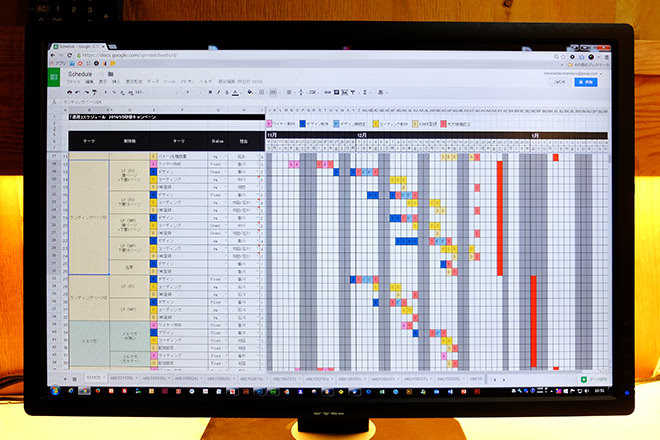こんにちは、河原崎です。
運用チームで、主にサイトのデザインを担当しています。
運用チームということで、わたしたちは名前の通りサイトを運用していく事が業務の中心です。
ひとつひとつのWEBサイトにはそれぞれの目的や思いがあり、それに対して同じ目線で向き合っており、依頼されたものを公開するだけではなく、担当者さんと同じ立場で自社のWEBサイトを扱うように運用業務に携わっています。
今回は、わたしたちが日々どのような事に心がけて担当案件と向き合っているか、その一部をご紹介します。
「間違わない」だけでは、「間違い」が起こる
運用の業務の中で、お客様からいただいた原稿やカタログをもとに、ECサイト内の販促物としてランディングページを制作する事があります。
その際気をつけている事は、お客様からご提供いただく原稿や資料をすべて“正”ととらえないようにすることです。
常識的な誤字脱字や言い回しのチェックは前提で、それに加えてお客様のWeb担当者としての目線でのチェックをおこなっています。
チェックを念入りに行い、何もなければそれでOK。何かあれば公開前に修正ができるため、一歩引いた目線を持つことがとても大事だと考えています。
実はこの作業に一番時間がかかっているかもしれません。
例えば、お客様からいただいた、ECサイトに使われるカタログ商品が先月と違う金額であった場合、これは何らかの理由(例えば商品の値上げ)で値段が変わっているだけかもしれませんが、単純に金額ミスである場合があります。
こういったミスは、毎月運用を担当しているからこそ気づける部分だと思います。
また、お客様からページ修正の依頼をいただいた場合も、依頼されたページだけでなく、他のページにも同様の修正をすべきところがないか、隅々まで目を通してチェックしています。
ただ言われた事をするだけでなく、運用しているサイトは担当として一番把握しているつもりで、責任を持って制作しています。

運用担当だからこその目線で、作成物を隅々までチェック。
情報は新鮮なうちに
月に5本前後のランディングページに加え、その関連箇所すべての更新作業をわたしたちが担当している、比較的大規模な運用プロジェクトがあります。
このプロジェクトに関わるメンバーは総勢8名にもおよび、決めるべき項目や実施すべき作業は山のようにあります。
日々発生するタスクや情報を共有するために、毎朝11時にプロジェクトメンバー全員が参加する進捗管理のミーティングを欠かさずに行っています。

毎朝の打ち合わせ時の様子。
スプレッドシートで作成したプロジェクトスケジュールを元に、プランナー、デザイナー、コーダーが各々、前日までの進捗と残タスクを報告し、担当者・状況・スケジュールを「見える化」して共有します。
ミーティングといっても5〜10分ほどですが、この当たり前の進捗管理を毎日行うことで、プロジェクトに遅れが出ていないか、抜けているタスクがないかを確認しています。また、各フェーズの担当間の進捗を共有することで、ワイヤー→デザイン→コーディングのフローをスムーズに回すことができます。
大型案件だけに限らず、全案件に、担当者同士が情報共有した状態で制作を行うことを大切にしています。
月々のスケジュールをスプレッドシートにして全員で共有することで、作業の漏れがないかと効率化を図っています。
制作クオリティの均一化を図るために
運用案件では、業務上、定例の更新作業が頻繁にあります。
このような決まった作業依頼があった場合に備え、案件によってスプレットシートで運用マニュアルを作成しています。
これは、運用フローを明確にすることで、誰が作業をしても同様のクオリティを出せるよう、クオリティの均一化を目的として作っています。
実際に運用マニュアルを使うことで、作業の手順を間違えたりチェック漏れをしてしまうなどのミスも減り、業務が大幅に改善されました。
案件に応じた適切なマニュアルを作ることで、運用しやすく成果の上がりやすい状態を保つことができます。

いかがでしょうか。
今回ご紹介した内容は、通常だと面倒と思う作業かもしれませんが、積み重ねることでチーム内のプロジェクトも管理がしやすくなりますし、制作物のクオリティも上がっていきます。
今回挙げた例以外にも、またの機会に運用チームならではの「心がけ」をご紹介したいと思います。

